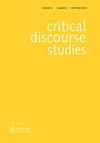An ‘attractive alternative way of wielding power’? Revealing hidden gender ideologies in the portrayal of women Heads of State during the COVID-19 pandemic
Carolin Debray, S. Schnurr, Joelle Loew, Sophie Reissner-Roubicek
求助PDF
{"title":"An ‘attractive alternative way of wielding power’? Revealing hidden gender ideologies in the portrayal of women Heads of State during the COVID-19 pandemic","authors":"Carolin Debray, S. Schnurr, Joelle Loew, Sophie Reissner-Roubicek","doi":"10.1080/17405904.2022.2101499","DOIUrl":null,"url":null,"abstract":"This paper explores the gendered discourses of the–seemingly favourable–media coverage that certain Heads of State received for their handling of the COVID-19 pandemic. Looking at media reports published in different English-speaking outlets in the US, the UK, India, Bangladesh, Singapore, New Zealand, Australia, and Ireland, and using multimodal feminist critical discourse analysis, we identify and describe strategies that on the surface appear to challenge hegemonic–and largely masculine–discourses of leadership. Upon closer scrutiny, these superficially complimentary reports rather reinforce and naturalise discriminatory gender ideologies, and, as we demonstrate, they do so to different degrees along a continuum of essentialising, contextualising, and problematising. We critically discuss the discursive and visual processes involved and show that complimenting these leaders on their performance compares them against a masculine norm to construct their leadership as ‘alternative', exceptional, and hence marked. This gendered portrayal of political leadership in times of crisis illustrates how the discursive construction of identities, responsibilities, and relationships during COVID-19 largely hinges on power relations and political ideologies that systematically disadvantage and undermine women. The purportedly positive form in which this occurs makes it particularly difficult to challenge and subvert these discriminatory discourses and their underlying gendered ideologies. © 2023 The Author(s). Published by Informa UK Limited, trading as Taylor & Francis Group.","PeriodicalId":46948,"journal":{"name":"Critical Discourse Studies","volume":" ","pages":""},"PeriodicalIF":2.1000,"publicationDate":"2023-01-23","publicationTypes":"Journal Article","fieldsOfStudy":null,"isOpenAccess":false,"openAccessPdf":"","citationCount":"0","resultStr":null,"platform":"Semanticscholar","paperid":null,"PeriodicalName":"Critical Discourse Studies","FirstCategoryId":"98","ListUrlMain":"https://doi.org/10.1080/17405904.2022.2101499","RegionNum":2,"RegionCategory":"文学","ArticlePicture":[],"TitleCN":null,"AbstractTextCN":null,"PMCID":null,"EPubDate":"","PubModel":"","JCR":"Q2","JCRName":"COMMUNICATION","Score":null,"Total":0}
引用次数: 0
引用
批量引用
Abstract
This paper explores the gendered discourses of the–seemingly favourable–media coverage that certain Heads of State received for their handling of the COVID-19 pandemic. Looking at media reports published in different English-speaking outlets in the US, the UK, India, Bangladesh, Singapore, New Zealand, Australia, and Ireland, and using multimodal feminist critical discourse analysis, we identify and describe strategies that on the surface appear to challenge hegemonic–and largely masculine–discourses of leadership. Upon closer scrutiny, these superficially complimentary reports rather reinforce and naturalise discriminatory gender ideologies, and, as we demonstrate, they do so to different degrees along a continuum of essentialising, contextualising, and problematising. We critically discuss the discursive and visual processes involved and show that complimenting these leaders on their performance compares them against a masculine norm to construct their leadership as ‘alternative', exceptional, and hence marked. This gendered portrayal of political leadership in times of crisis illustrates how the discursive construction of identities, responsibilities, and relationships during COVID-19 largely hinges on power relations and political ideologies that systematically disadvantage and undermine women. The purportedly positive form in which this occurs makes it particularly difficult to challenge and subvert these discriminatory discourses and their underlying gendered ideologies. © 2023 The Author(s). Published by Informa UK Limited, trading as Taylor & Francis Group.
一种“有吸引力的权力行使方式”?揭示新冠肺炎大流行期间女性国家元首形象中隐藏的性别意识形态
本文探讨了某些国家元首因处理新冠肺炎疫情而受到的媒体报道中的性别化话语。通过查看美国、英国、印度、孟加拉国、新加坡、新西兰、澳大利亚和爱尔兰不同英语媒体发表的媒体报道,并使用多模式女权主义批评话语分析,我们确定和描述了表面上似乎挑战霸权——主要是男性化——领导话语的策略。经过仔细审查,这些表面上的赞美报告反而强化了歧视性的性别意识形态并使其自然化,正如我们所证明的那样,它们在本质化、情境化和问题化的过程中在不同程度上做到了这一点。我们批判性地讨论了所涉及的话语和视觉过程,并表明赞扬这些领导者的表现将他们与男性规范进行比较,从而将他们的领导力构建为“另类”、卓越,因此具有显著性。这种对危机时期政治领导层的性别化描述说明了新冠肺炎期间身份、责任和关系的话语建构在很大程度上取决于权力关系和政治意识形态,这些关系和意识形态系统地对妇女不利和有损。这种情况以所谓的积极形式发生,使得挑战和颠覆这些歧视性话语及其潜在的性别意识形态变得特别困难。©2023作者。由Informa UK Limited出版,交易名称为Taylor&Francis Group。
本文章由计算机程序翻译,如有差异,请以英文原文为准。


